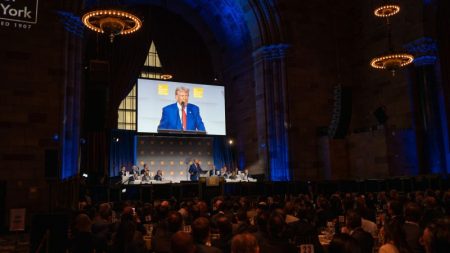Unlock the Editor’s Digest for free
Roula Khalaf, Editor of the FT, selects her favourite stories in this weekly newsletter.
Workers at a Volkswagen plant in Chattanooga, Tennessee voted to form a union on Friday, the first victory in the United Auto Workers’ campaign to build on last year’s strike against the Detroit Three by organising factories across the US south.
The workers, who voted 2,628 to 985 to join the union, had said that Volkswagen was underpaying them, targeting the German group as part of a $40mn campaign to organise workers at 13 mostly foreign-owned carmakers with non-union plants in the US.
The closely watched election underscores the resurgence of the labour movement in America. Union organisers see southern states including Tennessee as hostile territory and have tried to organise there for decades with little success.
Darrell Belcher, who has worked in assembly in the Chattanooga plant for 13 years, told the Financial Times that the union’s pitch to Volkswagen workers hinged on the record 25 per cent raises Ford, Stellantis and GM had agreed to after six weeks of strikes last year. The pay increases will be spread over the length of the 4.5 year contract.
“[The union] campaigns on ‘look at what Ford got’,” Belcher said. “They’ve really been pushing $40 [an hour] and free health insurance.”
Belcher voted against the union, saying union representatives could not guarantee that they could negotiate the same contract for Volkswagen employees.
In a statement, Volkswagen thanked its Chattanooga employees for voting and said it was waiting for federal labour officials to certify the result.
Volkswagen has previously said that it did not think that its Chattanooga employees needed a union because their pay, which ranges between $24.50 and $32.40 per hour, was already above average for the city.
Workers had already received a raise after the UAW signed new contracts with the Detroit automakers in November. Observers called it the “UAW bump.”
The union tried twice before to organise the Volkswagen plant, most recently in 2019. It lost that election 833 to 776.
At the time, the UAW faced fierce opposition from elected officials, local business leaders and a group of anti-UAW employees funded by anti-union interest groups, said Harry Katz, a professor of collective bargaining at Cornell’s School of Industrial and Labor Relations.
Southern lawmakers lured foreign automakers’ US manufacturing operations to states including Tennessee and Alabama with generous tax breaks and promises that they are inhospitable to unions that typically drive up labour costs. The region’s “right to work” laws give workers the ability to opt out of paying union dues, making it more difficult for labour organisations to support themselves financially.
But unions have surged in popularity since the Covid crisis. The UAW had the support of 76 per cent of US adults during last autumn’s strike, according to a CNN poll.
That meant that workers looking to unionise faced far less resistance during this election, according to Art Wheaton, the director of labour studies at Cornell’s School of Industrial and Labor Relations.
“The public is saying ‘we’re on their side,’ which I think took many people by surprise, including many Republican elected officials,” Wheaton said.
The Republican governors of Alabama, Georgia, Tennessee and Texas released a joint statement opposing the UAW on Tuesday, calling the union “special interests looking to come into our state and threaten our jobs and the values we live by”.
Republican Congressman Chuck Fleischmann, whose district encompasses the Volkswagen plant, told reporters that he would “[stay] out of it this time.”
“This is something that I’m going to let the workers decide,” Fleischmann said while boarding a flight to Chattanooga last week, according to the Huffington Post.
More than 70 per cent of the plant’s 4,300 employees signed union authorisation cards before the union filed an election petition last month, the UAW said.
UAW’s landslide victory in Chattanooga raises its hopes that it can repeat its success at Mercedes-Benz in Alabama, where federal labour officials have scheduled a union election next month. Winning there will be much more difficult than in Chattanooga, Wheaton said, because the union had a shorter history of organising at that plant.
UAW president Shawn Fain has said that he plans to organise more than two dozen additional auto plants across the southern US, including a Toyota plant in Missouri and a Nissan one in Mississippi.
“Southern workers are ready to stand up and win a better life,” Kelcey Smith, a worker in the paint department at Volkswagen Chattanooga, said in a statement.
Read the full article here



